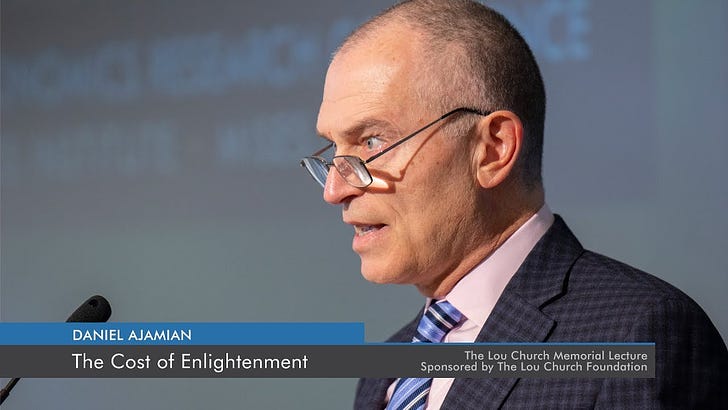Book: From Dawn to Decadence: 1500 to the Present: 500 Years of Western Cultural Life; The Cost of Enlightenment
From Dawn to Decadence: 1500 to the Present: 500 Years of Western Cultural Life - 802 pages
By Jacque Barzun. He wrote numerous other books. He spent his entire life writing this book and it was published after he reached the age of 90.
(Most people state his name as: Bar zoon. But I heard him state his name several times: Bar zun, with the emphasis on zun.)
Amazon:
"A stunning five-century study of civilization's cultural retreat." — William Safire, New York Times
Highly regarded here and abroad for some thirty works of cultural history and criticism, master historian Jacques Barzun has set down in one continuous narrative the sum of his discoveries and conclusions about the whole of Western culture since 1500.
Barzun describes what Western Man wrought from the Renaissance and Reformation down to the present in the double light of its own time and our pressing concerns. He introduces characters and incidents with his unusual literary style and grace, bringing to the fore those that have been forgotten or obscured. His compelling chapters—such as ‘Puritans as Democrats,’ ‘The Monarchs' Revolution,’ and ‘The Artist Prophet and Jester’—show the recurrent role of great themes throughout the era.
The triumphs and defeats of five hundred years form an inspiring saga that modifies the current impression of one long tale of oppression by white European males. Women and their deeds are prominent, and freedom (even in sexual matters) is not an invention of the last decades. And when Barzun rates the present not as a culmination but a decline, he is in no way a prophet of doom. Instead, he shows decadence as the normal close of great periods and a necessary condition of the creative novelty that will burst forth—tomorrow or the next day. [Notice this reference to “periods” with Barzun in the same sentence using the word “age” in his book. - JRD]
Only after a lifetime of separate studies covering a broad territory could a writer create with such ease the synthesis displayed in this magnificent volume.’
[You don’t have to read this book to understand a later post where I quote Barzun about the subjects “secularism” and “SECULARISM” that have two different meanings. The later post, where I will discuss these two words, includes reference to God. - JRD]
[But I mention the book not only because I quote from it but also because it is discussed by the speaker who mentioned the book a number of times in one of the best presentations I have heard in my life (in my opinion). I learned about the book from this presentation. That presentation is posted below. I do recommend that you watch/listen to the video but it is not absolutely necessary with respect to understanding my next post. - JRD]
[Both the book and the presentation were posted on this blog previously. - JRD]
—
“The Lou Church Memorial Lecture, sponsored by the Lou Church Foundation. Recorded at the Mises Institute on March 23, 2019. Includes an introduction by Joseph T. Salerno. The Austrian Economics Research Conference is the international, interdisciplinary meeting of the Austrian School, bringing together leading scholars doing research in this vibrant and influential intellectual tradition. The conference is hosted by the Mises Institute at its campus in Auburn, Alabama, and is directed by Joseph Salerno, professor of economics at Pace University and academic vice president of the Mises Institute.
Author: Daniel Ajamian
“Mr. Ajamian is a private consultant. During the last fifteen years he has been Chairman of the Board of Directors of several successful private-equity sponsored companies; prior to this he also held executive positions in similar companies. Most of these companies have been turnaround situations, some acquired out of bankruptcy. He currently serves as Chairman of the Board for the two such companies.”
This speaker and various other writers, primarily Austrian, understand that the “Enlightenment Age” caused most “religious” people in America (and other countries) to become secular and away from faith and God. I clearly understand this (previous sentence) from studying so very many hours about the siege and destruction of Jerusalem in 70 AD, which caused everything to become spiritual to God. - JRD
—
The transcript:
—


